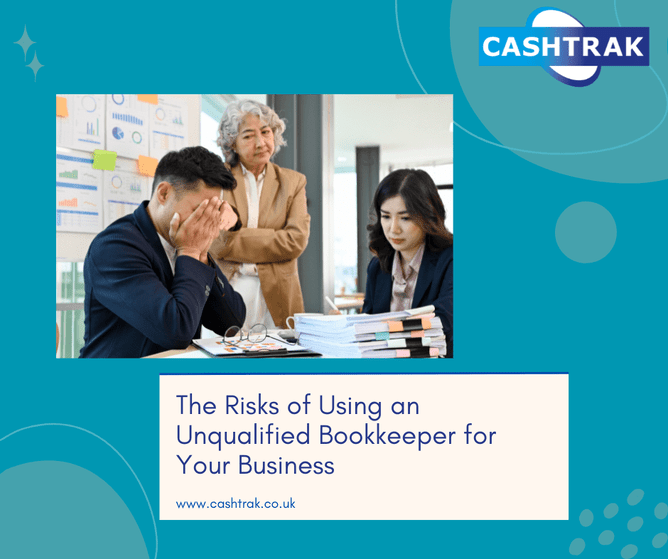When it comes to managing your business's finances, you want to ensure everything is handled with the utmost accuracy and professionalism however, cost is a big factor. With the current economic crunch, businesses have been cutting costs by outsourcing overseas (more on why outsourcing overseas may turn out to cost you more in the long run here here) or using an unqualified bookkeeper or accountant (in some cases both bookkeeper and accountant) who are often cheaper than qualified bookkeepers and accountants.
So, it is not surprising we have seen a rise in clients coming to us following an unqualified bookkeeper, accountant or outsourcing overseas has caused problems with their books.
It's important to make you aware that bookkeepers do not need formal qualifications to offer their services. While this can make it easier for individuals to enter the profession and offer their services at a discounted rate as they don’t have the overheads for qualified bookkeepers who have to undertake continual professional development (CPD), it also means there’s a higher risk for businesses that might unknowingly hire someone without the necessary skills or knowledge.
Here’s why using an unqualified bookkeeper and accountant could cause more problems than you might anticipate.
Lack of Professional Knowledge and Skills
Bookkeeping involves more than just recording transactions. It requires a comprehensive understanding of accounting principles, tax regulations, and financial management. An unqualified bookkeeper might lack:
Knowledge of current regulations - tax laws and financial regulations frequently change. A bookkeeper without proper training may not stay updated, leading to non-compliance issues.
Technical skills - proficient use of accounting software and tools is crucial. An unqualified bookkeeper may struggle with these, resulting in inefficient processes and errors.
Increased Risk of Error
Accuracy is critical in bookkeeping. Even small mistakes can have significant consequences, such as:
Financial discrepancies - errors in recording transactions can lead to inaccurate financial statements, making it difficult to gauge the true financial health of your business.
Tax penalties – incorrect use of VAT codes or misunderstanding of the complicated VAT system can result in fines and penalties from HMRC, adding unnecessary financial strain on your business.
Compliance Issues
A qualified bookkeeper ensures your business adheres to all relevant laws and regulations, such as:
VAT returns - incorrect VAT returns can trigger audits and penalties. An unqualified bookkeeper may not be well-versed in the specifics of VAT regulations.
Payroll management - proper handling of payroll is crucial for compliance with employment laws. And payroll is can be very complicated! Mistakes in this area can lead to legal issues and unhappy employees.
Lack of Professionalism and Accountability
Professional bookkeepers typically adhere to a code of conduct and have professional indemnity insurance, in our case we are governed by The Institute of Certified Bookkeepers who are the world’s leading bookkeeping organisation. It promotes and maintains the standards of bookkeeping as a profession through the establishment of relevant qualifications and the award of grades of membership that recognise academic attainment, working experience and competence. This means we are accountable for our work and can provide reassurance that your financial information is in very safe, experienced hands. Without these assurances, you may face:
Inconsistent quality - an unqualified bookkeeper may not provide the level of service and consistency needed to maintain accurate records.
No recourse for errors - if an unqualified bookkeeper makes a significant mistake, you may have limited options for recourse or compensation.
Missed Opportunities for Financial Growth
Qualified bookkeepers often bring additional value through strategic insights and advice. As a bookkeeping practice with almost 20 years’ experience, we have seen and experienced a lot! A wide range of businesses in many different industries of varying sizes from 1 person to 100s! We can help you understand your financial data, identify cost-saving opportunities, and plan for growth. An unqualified bookkeeper might miss these opportunities, leaving you without valuable guidance that could enhance your business’s performance.
Increased Stress and Workload
Hiring an unqualified bookkeeper could mean more oversight and correction on your part, leading to:
Time consumption - you may spend more time double-checking their work or fixing mistakes, detracting from your ability to focus on core business activities.
Stress - financial uncertainty and the potential for errors can increase stress levels, impacting your overall productivity and peace of mind.
How to Ensure You Hire a Qualified Bookkeeper
To avoid these risks, it’s crucial to vet potential bookkeepers thoroughly, the easiest option is to come to us! We are qualified, insured, experienced, fantastic team of friendly bookkeeper and governed by the largest bookkeeping organisation in the world!
However, should you chose to go elsewhere you should:
Check qualifications - look for formal qualifications from recognised bodies.
Ask about professional memberships - membership in professional organisations can indicate a commitment to ongoing education and adherence to ethical standards.
Check their testimonials from other clients (here’s ours here)
Conclusion
In conclusion, while it may be tempting to cut costs by hiring the cheapest bookkeeper or accountant, the potential risks and long-term costs far outweigh the initial savings. Ensuring your bookkeeper is qualified and experienced can safeguard your business from financial discrepancies, compliance issues, and missed growth opportunities, ultimately providing peace of mind and allowing you to focus on running your business.

